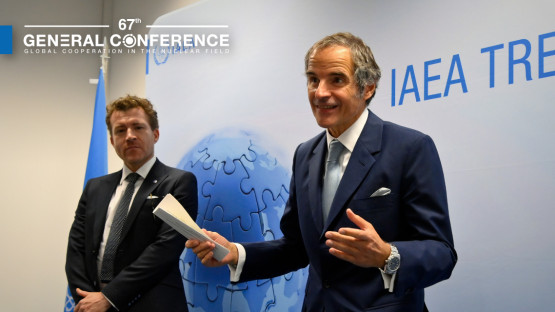 At the annual Treaty Event on the sidelines of the 67th regular session of the IAEA General Conference, three more countries pledged their commitment to nuclear safety, security, and the peaceful use of nuclear technology. Belarus, Egypt, and Zimbabwe all deposited legal instruments to become a party to various multilateral treaties under IAEA auspices. These cover a spectrum of subjects aiming to bolster global nuclear safety and security as well as enabling the development of nuclear science and technology.
At the annual Treaty Event on the sidelines of the 67th regular session of the IAEA General Conference, three more countries pledged their commitment to nuclear safety, security, and the peaceful use of nuclear technology. Belarus, Egypt, and Zimbabwe all deposited legal instruments to become a party to various multilateral treaties under IAEA auspices. These cover a spectrum of subjects aiming to bolster global nuclear safety and security as well as enabling the development of nuclear science and technology.
The Treaty Event, convened annually by the IAEA’s Office of Legal Affairs during the annual General Conference, aims to promote universal adherence to the most important multilateral treaties for which the Director General of the IAEA is depositary, and provide an opportunity to member states to deposit instruments of ratification, acceptance, approval or accession.
This year, Belarus ratified the Amendment to the Convention on the Physical Protection of Nuclear Material (A/CPPNM), Egypt ratified the Convention on Nuclear Safety (CNS), and Zimbabwe delivered six instruments. These included: the instruments of accession to the CNS; the Vienna Convention on Civil Liability for Nuclear Damage; the Joint Protocol Relating to the Application of the Vienna Convention and the Paris Convention; the Protocol to Amend the Vienna Convention on Civil Liability for Nuclear Damage; and instruments of acceptance of the Amendment to the CPPNM and of the Agreement on the Privileges and Immunities of the IAEA.
The CPPNM establishes legal obligations for Parties regarding the physical protection of nuclear material used for peaceful purposes during international transport; the criminalization of certain offences involving nuclear material; and international cooperation, for example, in the case of theft, robbery or any other unlawful taking of nuclear material or credible threat.
Its entry into force in 1987 and Amendment in 2016 were crucial milestones in the development of the international legal framework for nuclear security, as they remain the only internationally legally binding undertakings in the area of physical protection of nuclear material and of nuclear facilities used for peaceful purposes. The CPPNM, strengthened by its Amendment, is relevant for all States, not just those with nuclear facilities or nuclear materials.
The CNS aims to commit Contracting Parties operating land-based civil nuclear power plants to maintain a high level of safety by establishing fundamental safety principles to which States would subscribe. The Convention is based on the Parties’ common interest to achieve higher levels of safety that will be developed and promoted through regular meetings. It obliges Parties to submit reports on the implementation of their obligations for “peer review” at meetings held at IAEA Headquarters. This mechanism is the main innovative and dynamic element of the Convention.
The instrument of accession to the Vienna Convention on Civil Liability for Nuclear Damage aims to establish some minimum standards to provide financial protection against damage resulting from certain peaceful uses of nuclear energy. Since the objectives of the Vienna Convention are largely mirrored in the Paris Convention on Third Party Liability in the Field of Nuclear Energy, the Joint Protocol aims to establish treaty relations between the two Conventions, and to eliminate conflicts that may arise from the simultaneous application of both Conventions to the same nuclear incident.
The Agreement on the Privileges and Immunities of the IAEA, approved by the Board of Governors in 1959, grants immunity to the Agency, its property and assets from legal processes, and gives the Agency the capacity to contract, acquire and dispose of property and institute legal proceedings.
“The annual Treaty event is a vivid example of our expressed commitment to multilateralism. In the world of nuclear activities, we need certainty. Ambiguity is not a good idea when it comes to nuclear materials, when it comes to nuclear reactors, and when it comes to nuclear relations. Especially when this concept seems to be under so much strain, we have to commit ourselves to the legal norms that provide for universalization,” said IAEA Director General Rafael Mariano Grossi.
Image: Rafael Mariano Grossi, IAEA Director General, at the IAEA Treaty Event organised by the Office of Legal Affairs at the IAEA 67th General Conference, held at the Agency's headquarters in Vienna, Austria (courtesy of D Calma / IAEA)






